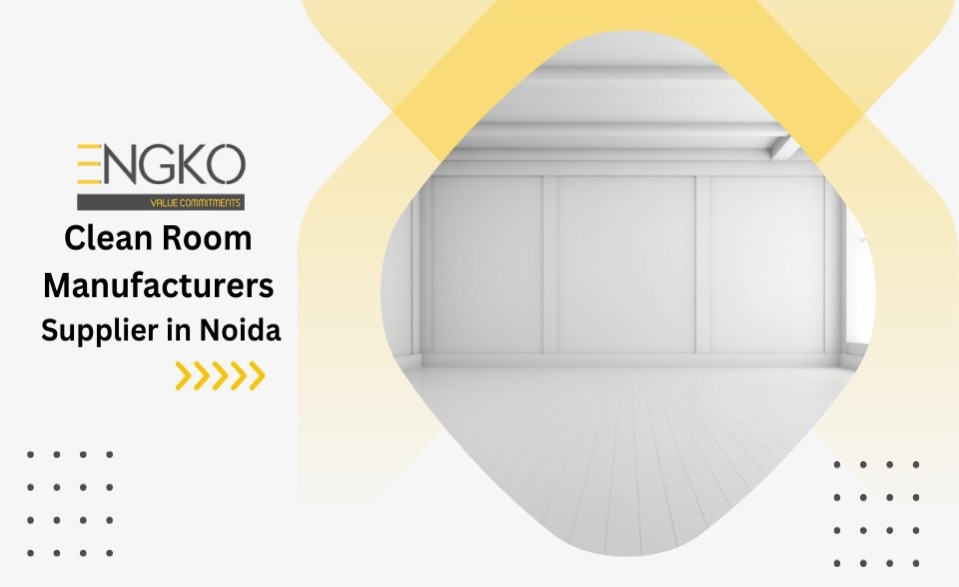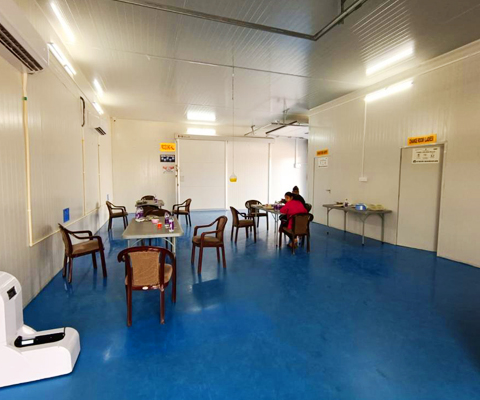Home > Blog detail

Jan 2025
Engko is a highly reliable company in Ghaziabad that specializes in manufacturing clean room. Our expertise lies in creating cleanrooms for various industries, not just medical firms. Cleanrooms are essential for industries such as electronic device manufacturing, automobile device manufacturing, and food ingredient manufacturing. We take pride in using only high-quality materials to build our clean rooms, ensuring that they meet the highest standards.
Engko is a business that offers clean room Manufacturers and Supplier services in Noida. Their cleanrooms are built with qualities including fire resistance, lifelong durability, and thermal efficiency. These cleanrooms are extensively utilized in a wide range of commercial and industrial settings, empowering businesses to be leaders in their fields. Prefabricated clean rooms in Noida are ideal for scientific research and food ingredient testing, and they must adhere to industry requirements for extremely sterile and safe applications.
In the world of precision manufacturing and cutting-edge technology, the clean room plays a pivotal role in ensuring the quality and reliability of products. Engko, a leading player in the industry, has established itself as a key player in delivering advanced solutions through its state-of-the-art cleanroom facilities. We will delve into the significance of cleanrooms at Engko, understanding their purpose, design, and the impact they have on the production of high-quality electronic components.

Clean rooms are controlled environments where the concentration of airborne particles is meticulously regulated to prevent contamination during the manufacturing process. In the electronics industry, where even the smallest particles can cause defects and malfunctions, the use of cleanrooms is crucial to ensuring product integrity.
At Engko, the cleanroom serves as a foundation for the production of electronic components that meet the highest industry standards. The controlled environment is designed to minimize particulate contamination, humidity, and temperature variations, providing an ideal setting for the intricate processes involved in electronic manufacturing.
Engko's commitment to excellence is reflected in the design and features of its modular room facilities. The cleanroom is engineered with precision, incorporating advanced technologies and adhering to strict regulatory standards. Some key features include:
HEPA and ULPA Filtration Systems: Engko's cleanroom is equipped with High-Efficiency Particulate Air (HEPA) and Ultra-Low Penetration Air (ULPA) filtration systems. These filters effectively remove microscopic particles, ensuring a controlled and sterile environment.
Temperature and Humidity Control: Maintaining a stable environment is essential in electronic manufacturing. Engko's cleanroom is equipped with state-of-the-art temperature and humidity control systems, guaranteeing optimal conditions for production.
Clean Room Garments and Protocols: Personnel working in the clean rooms adhere to strict gowning procedures. Engko implements comprehensive protocols to minimize the introduction of contaminants, including the use of cleanroom garments, gloves, and footwear.
Advanced Monitoring Systems: Real-time monitoring of environmental conditions is crucial for quality control. Engko's cleanroom is equipped with advanced monitoring systems that continuously assess factors such as particle count, temperature, and humidity, ensuring compliance with industry standards.
High-Quality Product Output: The stringent control measures implemented in Engko's cleanroom contribute to the production of electronic components with minimal defects, ensuring high-quality output.
Compliance with Industry Standards: Engko's cleanroom facilities adhere to international standards and regulations, demonstrating the company's commitment to delivering products that meet or exceed industry expectations.
Reliable Performance: Electronic components manufactured in Engko's cleanroom demonstrate superior reliability and performance, making them suitable for critical applications in various industries.
Semiconductor Manufacturing: The semiconductor industry relies heavily on cleanroom manufacturing to produce microchips and electronic components with extreme precision. Even a tiny particle can disrupt the functionality of these delicate components, making clean rooms essential.
Pharmaceutical and Biotechnology: Clean rooms are crucial in pharmaceutical and biotechnology manufacturing to ensure the production of sterile drugs, vaccines, and medical devices. Contamination in these industries can have severe consequences for both product quality and patient safety.
Aerospace and Defense: The aerospace and defense sectors utilize cleanroom facilities for the assembly and testing of sensitive equipment, such as satellites and spacecraft components. Clean rooms help maintain the integrity of critical systems in these applications.
Smart Cleanroom Technologies: The integration of smart technologies, such as sensors and monitoring systems, allows for real-time tracking of environmental conditions within cleanroom. This data can be used to optimize processes, enhance energy efficiency, and ensure compliance with regulatory standards.
Nanotechnology in Cleanroom Design: Nanotechnology is increasingly being employed in the design and construction of cleanrooms to create smoother surfaces and reduce particle generation. This contributes to higher cleanliness levels and improved overall performance.
Energy-Efficient HVAC Systems: Advancements in heating, ventilation, and air conditioning (HVAC) systems have led to more energy-efficient solutions for cleanrooms. These systems not only maintain the required cleanliness levels but also contribute to sustainability goals by reducing energy consumption.
Modular Clean Room Design: Modular cleanroom designs provide flexibility and scalability, allowing companies to adapt to changing production needs quickly. This approach minimizes downtime during reconfiguration and expansion while maintaining the required cleanliness standards.
Clean room manufacturing continues to be a critical element in various industries, ensuring the production of high-quality and reliable products. As technology evolves, so do the tools and techniques used in cleanroom design and operation. The integration of smart technologies, advancements in nanotechnology, and a focus on sustainability are shaping the future of clean room manufacturing, enabling industries to meet the ever-increasing demands for precision and cleanliness in their processes.
Q. What is Cleanroom manufacturing?
Cleanroom manufacturing refers to a controlled environment where the concentration of airborne particles, temperature, humidity, and other environmental factors are regulated to ensure a high level of cleanliness. It is crucial for industries like semiconductor manufacturing, pharmaceuticals, and biotechnology.
Q. Why is Cleanroom manufacturing necessary?
Cleanroom manufacturing is essential to prevent contamination of sensitive products or processes by airborne particles, microbes, or other pollutants. It ensures the quality, reliability, and performance of products, especially in industries requiring stringent cleanliness standards.
Q. What are the key parameters controlled in a Cleanrooms?
The key parameters controlled in a Cleanrooms include particle count, temperature, humidity, air pressure, and airflow velocity. These parameters are carefully monitored and maintained to meet specific cleanliness standards.
Q. What industries commonly use Cleanroom manufacturing?
Cleanroom manufacturing is extensively used in industries such as semiconductor manufacturing, pharmaceuticals, biotechnology, aerospace, electronics, and healthcare, where product quality and reliability are of utmost importance.
Call
: +91-9667986005